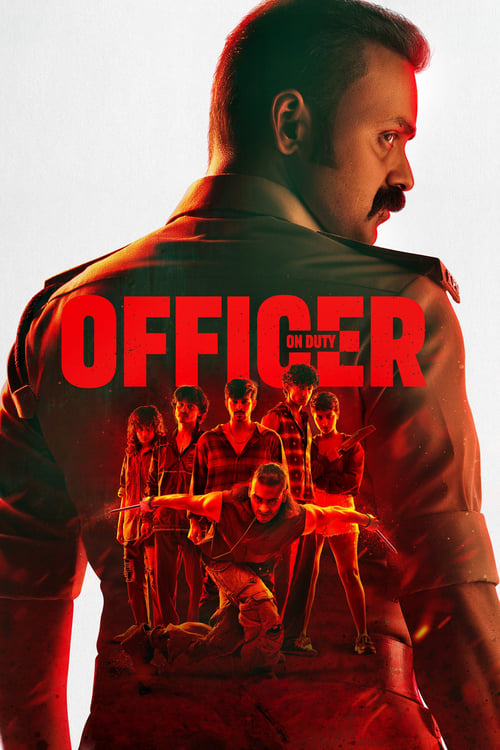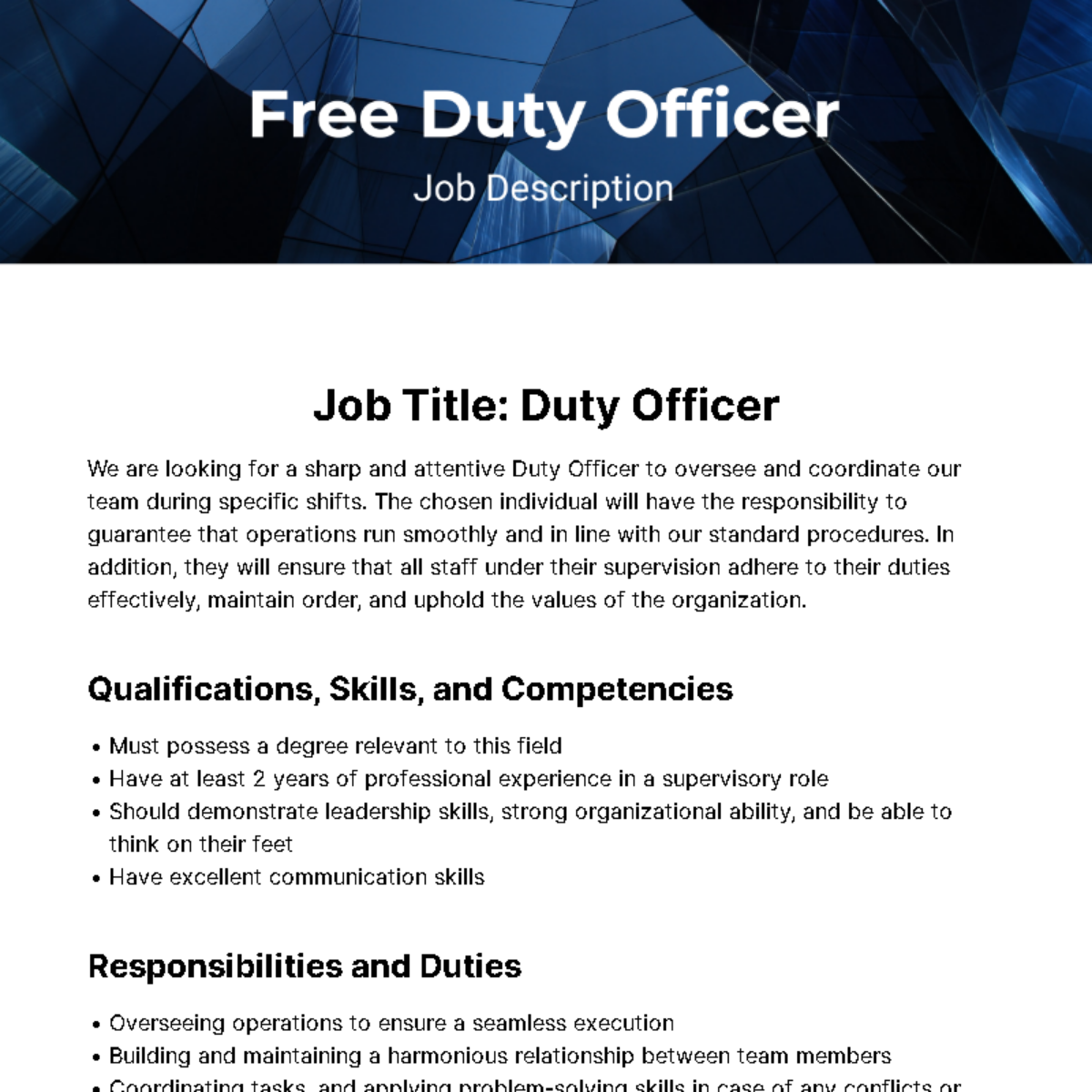Have you ever wondered who keeps the wheels of an organization spinning when everyone else is off-duty? Enter the officer on duty, the unsung hero of operational continuity. Whether it's a corporate office, a military base, or even a hospital, the role of an officer on duty is critical. They're the ones ensuring that everything runs smoothly, even during the quietest hours of the night or the busiest moments of the day.
Think about it for a second—what happens when emergencies strike, or a critical decision needs to be made after hours? This is where the officer on duty steps in, ready to take charge and make decisions that could impact the entire organization. It's not just a job; it's a responsibility that requires sharp thinking, quick decision-making, and an unwavering sense of duty.
But let's not get ahead of ourselves. Before we dive deep into the world of being an officer on duty, it's important to understand what this role really entails. Spoiler alert: it’s not all about sitting behind a desk and answering calls. There's so much more to it, and that's exactly what we'll explore in this article. So buckle up and let's get started!
Read also:Edible Gummy Im Feeling Yummy The Sweet Revolution You Can Chew On
Who Is an Officer on Duty?
At its core, an officer on duty is the designated individual responsible for overseeing operations during specific shifts. They act as the go-to person for anything that might pop up during their watch. Whether it’s managing unexpected challenges, coordinating teams, or ensuring compliance with protocols, the officer on duty is the linchpin of organizational efficiency.
The Key Responsibilities
So, what exactly does an officer on duty do? Here's a quick rundown:
- Overseeing daily operations to ensure smooth functioning.
- Responding to emergencies and making critical decisions.
- Coordinating with team members and other departments.
- Maintaining records and logs of all activities during their shift.
- Handling unexpected situations with calmness and professionalism.
It’s a role that demands multitasking and adaptability. You’re not just solving problems; you’re anticipating them before they even arise. Think of it like being the air traffic controller of an organization—keeping everything in check while navigating through potential turbulence.
What Makes a Great Officer on Duty?
Not everyone can step into the shoes of an officer on duty. It takes a unique set of skills and qualities to excel in this role. Let’s break it down:
Skills and Qualities
Leadership: Being in charge means taking the lead. A great officer on duty knows how to inspire and guide their team, even under pressure.
Communication: Clear and concise communication is key. Whether it’s giving instructions or reporting incidents, the ability to convey information effectively is crucial.
Read also:How To Scan Qr Code Moviebox Your Ultimate Guide
Problem-Solving: Challenges can pop up at any time. The best officers are quick thinkers who can analyze situations and come up with solutions on the fly.
Training and Development
Becoming an officer on duty isn’t something you can just jump into. Most organizations require candidates to undergo rigorous training programs. These programs cover everything from emergency protocols to conflict resolution. Plus, ongoing development is essential to stay updated with the latest trends and technologies in the field.
Understanding the Officer on Duty Role in Different Settings
The role of an officer on duty can vary depending on the environment. Let’s explore how it plays out in different sectors:
Hospital Setting
In hospitals, the officer on duty is often a senior nurse or administrator responsible for overseeing patient care and managing staff during their shift. They ensure that all medical protocols are followed and that patients receive the attention they need, even outside regular hours.
Military Operations
When it comes to the military, the officer on duty is a crucial link in the chain of command. They’re responsible for maintaining security, monitoring intelligence reports, and coordinating with other units. It’s a high-stakes role where every decision can have significant consequences.
Corporate Environment
In corporate settings, the officer on duty might be overseeing IT infrastructure, ensuring cybersecurity measures are in place, or managing logistics. Their focus is on keeping the business running smoothly, no matter the hour.
Common Challenges Faced by Officers on Duty
Life as an officer on duty isn’t all smooth sailing. There are challenges that come with the territory. Here are some of the most common ones:
Managing Stress
Let’s face it—being on call 24/7 can be stressful. Officers on duty often deal with high-pressure situations where the margin for error is slim. Learning to manage stress and maintain composure is essential for long-term success in this role.
Dealing with Unexpected Situations
No matter how well-prepared you are, there will always be unforeseen circumstances. From equipment failures to natural disasters, officers on duty need to be ready to adapt and respond quickly.
Maintaining Work-Life Balance
The unpredictable nature of the job can make it challenging to maintain a healthy work-life balance. It’s important for officers to prioritize self-care and set boundaries to avoid burnout.
Technology and the Officer on Duty
In today’s digital age, technology plays a pivotal role in enhancing the capabilities of officers on duty. From advanced monitoring systems to real-time communication tools, tech innovations are making it easier to manage operations efficiently. Here are some examples:
- Surveillance cameras and sensors for enhanced security.
- Mobile apps for instant communication with team members.
- Data analytics tools for better decision-making.
However, it’s important to remember that technology is a tool, not a replacement for human judgment. Officers on duty still need to rely on their instincts and experience to navigate complex situations.
The Importance of Protocols and Procedures
Every organization has its own set of protocols and procedures that officers on duty must follow. These guidelines are designed to ensure consistency and accountability in operations. Some key aspects include:
Emergency Response Plans
Having a clear plan of action for emergencies is crucial. Officers on duty should be well-versed in these plans and ready to execute them when needed.
Documentation and Reporting
Keeping accurate records of all activities during their shift is another important responsibility. This documentation serves as a reference for future audits and investigations.
Building Trust and Authority
Trust and authority are the cornerstones of being an effective officer on duty. Here’s how officers can build these qualities:
Consistency
Being consistent in actions and decisions helps establish trust among team members. Officers who follow through on their promises and maintain transparency are more likely to earn respect.
Communication
Open lines of communication foster a sense of collaboration and trust. Officers should encourage feedback and create an environment where team members feel comfortable sharing their thoughts and concerns.
Future Trends in the Officer on Duty Role
As industries evolve, so does the role of the officer on duty. Here are some trends to watch out for:
Increased Use of AI
Artificial intelligence is gradually making its way into operational management. Officers on duty may soon rely on AI-powered tools to predict and prevent potential issues before they occur.
Remote Monitoring
With advancements in technology, remote monitoring is becoming more feasible. Officers on duty could potentially oversee operations from a distance, reducing the need for physical presence.
Final Thoughts
Being an officer on duty is more than just a job—it’s a calling. It requires a combination of skills, dedication, and resilience to excel in this role. From managing emergencies to ensuring operational continuity, officers on duty play a vital role in the success of any organization.
So, the next time you see an officer on duty silently working behind the scenes, take a moment to appreciate their hard work. And if you’re considering stepping into this role, remember that it’s a journey of growth and learning that can be incredibly rewarding.
What are your thoughts on the role of an officer on duty? Share your experiences or ask questions in the comments below. And don’t forget to check out our other articles for more insights into various roles and responsibilities!
Table of Contents
- Who Is an Officer on Duty?
- What Makes a Great Officer on Duty?
- Understanding the Officer on Duty Role in Different Settings
- Common Challenges Faced by Officers on Duty
- Technology and the Officer on Duty
- The Importance of Protocols and Procedures
- Building Trust and Authority
- Future Trends in the Officer on Duty Role
- Final Thoughts


